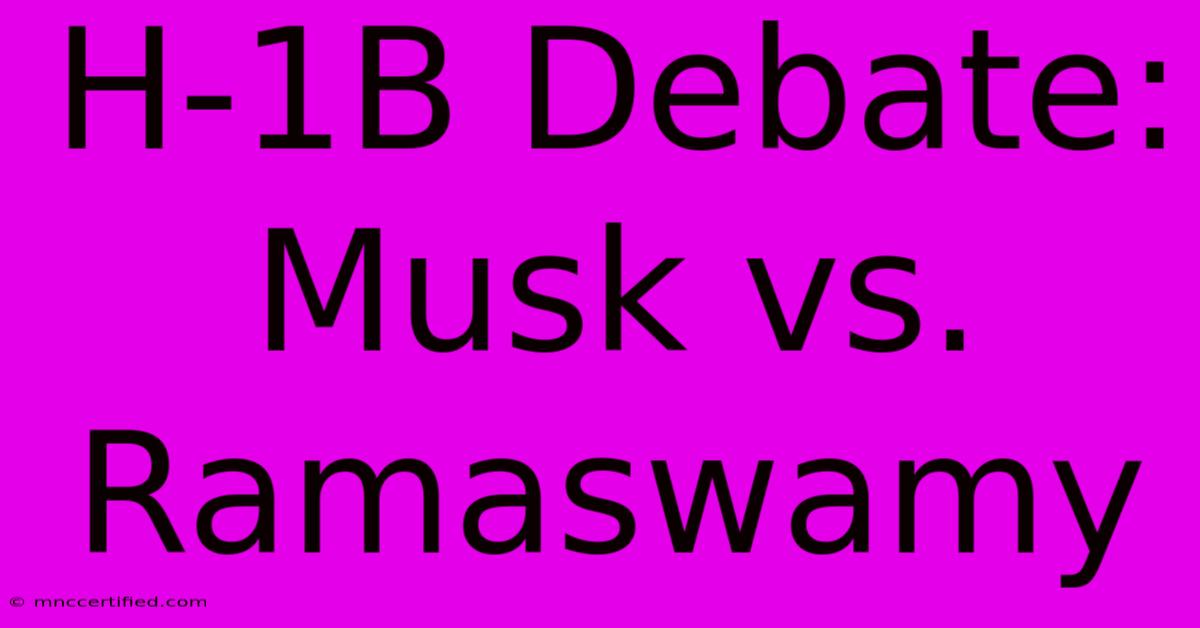H-1B Debate: Musk Vs. Ramaswamy

Table of Contents
H-1B Debate: Musk vs. Ramaswamy – A Clash of Tech Titans
The H-1B visa program, designed to bring highly skilled foreign workers to the United States, has long been a source of heated debate. Recently, the conflict has intensified with prominent figures like Elon Musk and Vivek Ramaswamy staking out opposing positions. This article delves into the core arguments of this clash, examining the perspectives of both tech giants and the implications for the future of the American tech industry.
Musk's Stance: A Need for Skilled Workers
Elon Musk, CEO of Tesla and SpaceX, has consistently voiced his support for a more liberal H-1B visa program. He argues that the current system is insufficient to meet the demands of the booming American tech sector. His argument centers on the shortage of skilled engineers and programmers, a shortage he believes hinders innovation and economic growth. Musk contends that restricting the flow of highly qualified foreign talent prevents American companies from competing effectively on a global scale. He emphasizes the crucial role these workers play in driving technological advancements and creating jobs.
Key Arguments for a More Open H-1B System:
- Talent Acquisition: The US needs access to the global pool of talent to remain competitive. Restricting H-1B visas limits access to the best and brightest minds worldwide.
- Economic Growth: Highly skilled immigrants contribute significantly to the US economy through innovation, entrepreneurship, and tax revenue.
- Innovation: A diverse workforce fosters innovation and leads to breakthroughs in various technological fields.
- Addressing Skill Gaps: The H-1B program can help fill critical skill gaps in STEM fields, boosting productivity and competitiveness.
Ramaswamy's Counterargument: Prioritizing American Workers
Vivek Ramaswamy, a prominent entrepreneur and author, takes a more protectionist stance. He advocates for reforms that prioritize American workers and limit the number of H-1B visas issued. Ramaswamy's argument emphasizes the importance of protecting American jobs and ensuring that US citizens have priority in the tech industry. He argues that the current system allows companies to exploit the program, potentially suppressing wages for American workers and undercutting domestic talent development.
Key Arguments for Restricting H-1B Visas:
- Protecting American Jobs: The H-1B program should not displace American workers, particularly in a time of economic uncertainty.
- Wage Suppression: An influx of foreign workers on H-1B visas can potentially depress wages for American counterparts.
- Focus on Domestic Talent Development: The US should prioritize investing in STEM education and training programs to build a robust domestic workforce.
- Addressing Potential Abuse: The H-1B system is susceptible to abuse, with some companies potentially prioritizing cheaper foreign labor over American workers.
The Broader Implications of the Debate
The Musk vs. Ramaswamy debate highlights a fundamental tension within the American tech industry: the need for global talent versus the desire to protect domestic workers. This isn't simply a battle of personalities; it's a reflection of a much larger conversation about immigration policy, economic competitiveness, and the future of work. The outcome of this debate will significantly impact the landscape of the American tech industry for years to come, influencing innovation, economic growth, and the overall availability of skilled labor.
Conclusion: A Balanced Approach?
Finding a balance between attracting top global talent and safeguarding the interests of American workers is crucial. A well-structured H-1B program could potentially address both concerns. This might involve stricter enforcement against abuse, a more targeted approach to filling specific skill gaps, and increased investment in domestic STEM education and training. The conversation needs to move beyond simplistic narratives and focus on evidence-based solutions that promote both innovation and fair competition. The future of the American tech sector depends on finding a sustainable and equitable approach to the H-1B visa program.
Keywords: H-1B visa, Elon Musk, Vivek Ramaswamy, immigration policy, tech industry, skilled workers, American jobs, STEM, innovation, economic growth, wage suppression, immigration debate, tech talent shortage.

Thank you for visiting our website wich cover about H-1B Debate: Musk Vs. Ramaswamy. We hope the information provided has been useful to you. Feel free to contact us if you have any questions or need further assistance. See you next time and dont miss to bookmark.
Featured Posts
-
Olivia Husseys Romeo And Juliet Role
Dec 28, 2024
-
Who Plays Syracuse Football 2025
Dec 28, 2024
-
Nyt Connections Hints Today Dec 28
Dec 28, 2024
-
Vanderbilt Vs Georgia Tech Bowl Game Analysis
Dec 28, 2024
-
Torres Joins Tigers On One Year Contract
Dec 28, 2024